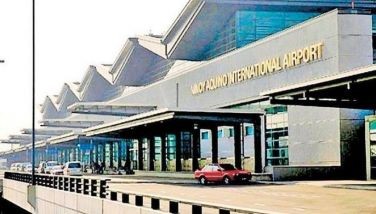44 Pinoys arriving from Japan
MANILA, Philippines - Only 44 Filipinos in areas affected by the Fukushima Dai-ichi nuclear power plant radiation leaks responded to the Philippine government’s call to be repatriated today.
DFA spokesman Eduardo Malaya said yesterday the repatriates are due to arrive this afternoon via a Philippine Airlines (PAL) commercial flight from Narita Airport.
Philippine Ambassador to Japan Manuel Lopez will accompany them.
Foreign Affairs Secretary Albert del Rosario admitted that the government couldn’t resort to mandatory repatriation “because there is no way we can force anyone to go.”
The situation is similar to Libya where the government has called for mandatory repatriation due to the worsening conflict there, but many Filipinos did not avail of the repatriation program.
The DFA said last Wednesday at least 55 Filipinos, including children, within the 100-kilometer radius of the Fukushima Dai-ichi nuclear power plant had expressed interest to be repatriated to the Philippines because of the possible effects of long-term accumulation of and exposure to radioactive particles in northeastern Japan.
Rendezvous area
Citing a report of the Philippine embassy in Tokyo, the DFA has also identified Omiya in Saitama prefecture as a rendezvous area for Filipinos where their travel documents will be processed before repatriation.
Some Filipinos who had earlier confirmed interest to be repatriated have opted to remain in Japan.
Del Rosario announced last Tuesday that the Philippine government would begin today (Sunday) the mandatory repatriation of Filipinos who live within the 50-kilometer radius of the Fukushima Dai-ichi plant.
Japan raised the crisis level in the area following the widespread accumulation of radiation leaks.
As a precautionary measure, Del Rosario said the Philippines would declare voluntary repatriation for Filipinos living from a 50-kilometer to 100-kilometer radius.
Each chartered flight that would carry 400 passengers would cost the government $200,000, he said.
Most serious level
The embassy has arranged accommodations in Saitama while awaiting the repatriation of Filipinos after the reclassification by the Japanese government of the crisis level of the Fukushima Dai-ichi plant accident from 5 to 7 in the International Nuclear and Radiological Event Scale (INES).
Level 7 is the most serious level on the INES and is used to describe a major release of radioactive material with widespread health and environmental effects that require the implementation of planned and extended counter-measures.
The crisis level at the crippled nuclear plant was raised to a severity on par with the 1986 Chernobyl disaster, citing high overall radiation leaks that have contaminated air, tap water, vegetables and seawater.
Earlier, Japan declared the area within the 20-kilometer radius of the nuclear plant as an exclusion zone. Those residing or working in the area have already been evacuated.
Health screening
Before their departure for the Philippines, Filipinos will undergo health screening at radiation screening facilities run by the Japanese government in Fukushima.
Some 2,000 Filipinos, not counting children, reside within the 100-kilometer radius of the nuclear power plant.
Most are long-term residents married to Japanese nationals and their children.
- Latest
- Trending
































